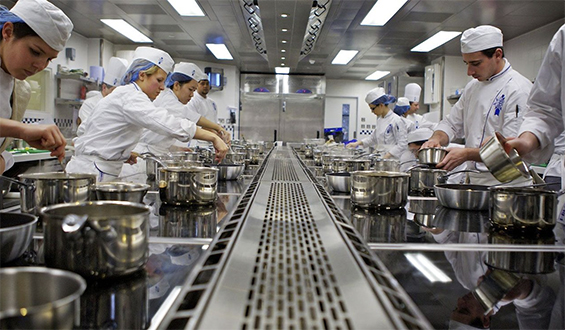
Le Cordon Bleu College of Culinary Arts cooking school in Portland, Oregon will be ending its 30-year food education program in 2017 – and it’s not alone. The school is part of a 16-school US culinary school network run by Career Education Corp., which announced that its culinary programs will be phased out by September of 2017.
The Oregonian’s Grant Butler reports that there will be no new enrollments after classes commence in January, but new students who have enrolled will be able to complete their training.
The reason for the closings is recent federal regulation that limit federal funding to for-profit schools. One of the new rules will limit loan payments to 20% of a graduate’s wages after taxes.
“New federal regulations make it difficult to project the future for career schools that have higher operating costs, such as culinary schools that require expensive commercial kitchens and ongoing food costs,” President and Chief Executive Todd Nelson said in a statement to The Los Angeles Times.
According to the Department of Education, the average tuition fees for the Portland Le Cordon Bleu school students enrolled in 2014 was $13,361 annually. In that year, the Portland school had 442 students.
The school opened in 1983 as the Horst Mager Culinary Institute, named for the Portland chef who was a co-founder of the school. The school became the Western Culinary Institute in 1986 and was affiliated with Le Cordon Bleu in 1999. The school moved to its downtown Portland venue in 2003 and changed its name to Le Cordon Bleu in 2010.
The school has produced acclaimed chefs such as Matt Lightner, chef at Portland’s much-lauded Castagna, who then took his skills to New York City. The late Homaro Cantu became well-known for his molecular gastronomy skill at Chicago’s Moto Restaurant.
The James Beard Award-winning chef Vitaly Paley says he has hired many chefs from Le Cordon Bleu over the years. He added that it was a sad day to see a school that has produced so many of Portland’s most gifted chefs closing.
Doug Adams, who has ties to Le Cordon Bleu and competed on television’s “Top Chef,” said accruing deep debt for a degree was one of the things that dissuades young people from pursuing a culinary education. Beginning chefs earn almost minimum wage when they enter the profession, and that makes student debt payments even more difficult.
Criticism has been cast on the Career Education Corp. alleging that it was engaged in fraudulent and improper business operations. It was accused of overstating the educational value of its program and of providing unclear job-placement rates. A 2008 lawsuit stated that 70% of its graduates earned under $22,500 per year, too little to comfortably pay off student loans.
The Paris and London campuses are run separately from the US locations and will not be closing, says Meagan McGinnes of The Boston Globe. The Boston campus of Le Cordon Bleu, on First Street in Cambridge, will be closed.
The Obama administration’s “gainful employment rule” is based on the notion that graduates who borrow money at high rates to pay for their education need to be able to make enough when they graduate to pay off their student loans. The rule cuts off federal financial aid to schools that cannot ensure that this can be accomplished by their students.
Julia Child attended the Paris campus of Le Cordon Bleu in the late 1940s. The Paris school opened in 1895.
Even though Le Cordon Bleu is considered “the largest network of culinary and hospitality schools in the world,” according to its website, this school and other culinary institutes have come under scrutiny for high tuition costs, rising drop-out rates, and grim job prospects, says Adam Callaghan reporting for Eater.
Callaghan adds that Eater analyzed data concerning culinary schools over the summer and found that many have been sued for deceptive recruiting practices, with Career Education Corp. settling a class-action suit brought by former students amounting to $40 million.




